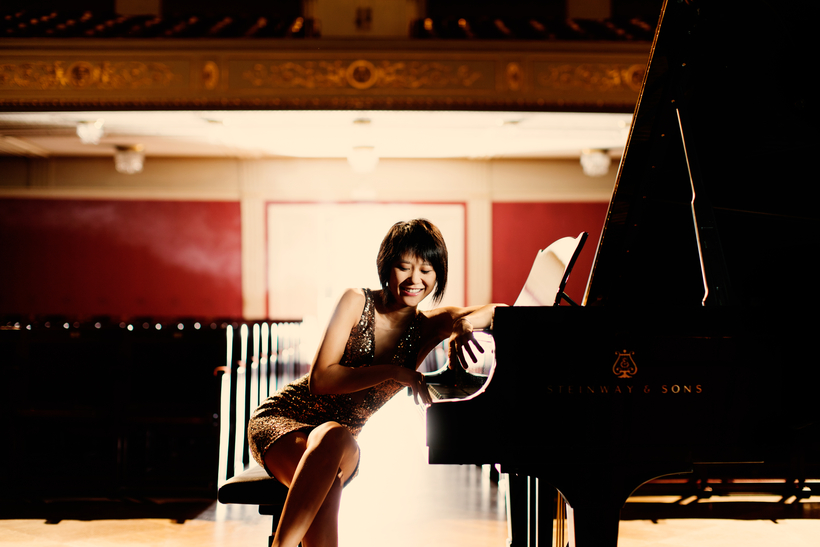Rachmaninoff’s Piano Concerto No. 3 in D minor, op. 30, got its shot at pop glory in 1996, when Geoffrey Rush, starring in the Australian biopic Shine, won the Oscar for Best Actor. Rush impersonated the budding pianist David Gotthelf, who against steep odds overcame emotional abuse and mental illness to build an international concert career. His signature piece? “Rach Three,” by repute the most difficult of all piano concertos.
With Yuja Wang on deck, technical challenges are a red herring. Whatever the music, the 36-year-old Beijing-born phenomenon tosses it off like child’s play. What’s more, she has a broader appreciation of Rachmaninoff’s appeal. In February, she created a sensation in Los Angeles, performing all four of his piano concerti plus the equally daunting “Rhapsody on a Theme of Paganini” in a series with Gustavo Dudamel and the LA Phil. The whole set, filmed live at those concerts, premieres on video as Yuja Wang & Gustavo Dudamel: Rachmaninoff Concertos on April 1, the running time a tight 140 minutes.

In January, Wang ran the same course under yet more historic circumstances. In partnership with Yannick Nézet-Séguin and the Philadelphia Orchestra, she regaled an overflow crowd at Carnegie Hall with the five-leg Rachmaninoff marathon in a straight four-and-a-half hours. “To these scores’ vast demands she brought both clarity and poetry,” Zachary Woolfe wrote in The New York Times. “She played with heft but not bombast, sentiment but not schmaltz.” And she never even broke a sweat.
None of this should have come as too much of a surprise. Once, when an interviewer quizzed Wang about the evergreen appeal of Rachmaninoff’s “warhorses,” she had this to say: “Those Russian pieces, they have a way of bringing out all the emotions, longings, the nostalgic feelings in us—so we feel really human, but at the same time it’s like something larger-than-life, larger-than-human, something we’re all connected to, like a collective maestoso glorious feeling about it—that we are part of something bigger than us. That being said, they’re fun.”
At Carnegie Hall, unscripted drama intervened when a member of the audience suffered a medical crisis, stopping the music cold. The incident prompted a humane, almost novelistic aside from Clemency Burton-Hill, a critic for the Financial Times. “Wang — who, it seems to me, is really an exquisite and generous chamber musician masquerading as a showstopping soloist—rarely looks at the audience until she is taking a bow,” Burton-Hill observed. “Now she looked to us: all absolute confusion, even fear. Very different from the virtuosity she customarily exudes at the keyboard. She appeared suddenly very young.” A harrowing half hour later, Carnegie Hall’s executive and artistic director Clive Gillinson brought news: “He’s breathing!”
“You know,” Nézet-Séguin said next, “we always say music is life. But: life comes first!” So, the concert continued, building to Rach Three as the grand finale. And with all the warhorses behind her, Wang returned for Gluck’s “Dance of the Celestial Spirit” as an encore.
Yuja Wang & Gustavo Dudamel: Rachmaninoff Concertos is available for streaming on the Stage+ Web-site starting April 1
Matthew Gurewitsch writes about opera and classical music for AIR MAIL.He lives in Hawaii

